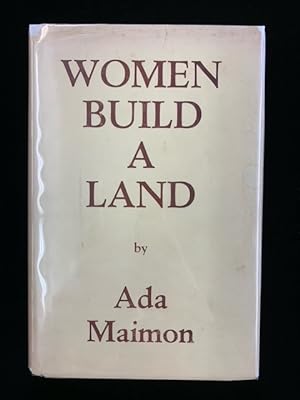Maimon, Ada (5 results)
Product Type
- All Product Types
- Books (5)
- Magazines & Periodicals
- Comics
- Sheet Music
- Art, Prints & Posters
- Photographs
- Maps
-
Manuscripts &
Paper Collectibles
Condition
- All Conditions
- New
- Used
Binding
- All Bindings
- Hardcover
- Softcover
Collectible Attributes
- First Edition
- Signed
- Dust Jacket (3)
- Seller-Supplied Images (2)
- Not Printed On Demand
Seller Location
Seller Rating
-
hardcover, Condition: Very Good, Herzl Press, NY c.1962, 8vo. cloth, 294pp., VG, $.
-
Women Build a Land
Published by Herzl Press, New York, NY, 1962
Seller: Second Edition Books, Butte, MT, U.S.A.
Book
Hardcover. Condition: Good. Dust Jacket Condition: Good. Binding tight, interior clean and bright, save for previous owner's writing on ffep and inner front board. Green boards bumped at spine ends and along top edges near spine. Dj preserved in mylar, not price clipped ($6.00); chipping to corners and spin ends, mild soiling, 1" open tear to dj back by upper spine end, water spots to spine. "The role of women in the creation of the Jewish State forms a fascinating chapter not only in the history of modern Israel but in the development of feminism as an ideology." - dj flap. 294 pp.
-
Hamishim shenot Tenu'at ha-po'alot: 1904-1954.
Published by Hotsaat Ayanot, Tel Aviv, 1955
Seller: Henry Hollander, Bookseller, Los Angeles, CA, U.S.A.
Hardbound. Condition: Very Good. Octavo in mildly edgeworn dust jacket with a few short tears, label near the base of the spine, 276 pp., b/w photos, tables Text is in Hebrew.
-
Women Build a Land
Published by Herzl Press, New York, 1962
Seller: The Book Gallery, Jerusalem, Israel
Includes black and white plates. 14.5x22 cm. 294 pages. Hardcover in dust jacket. Top and bottom of spine slightly stained. Else in good condition. The book is in : English.
-
Ayanoth
Published by WIzo - Women's International Zionist Organization and The Women Workers' Council, Tel Aviv, Israel, 1948
Seller: Meir Turner, New York, NY, U.S.A.
Book
Hardcover. Condition: Very Good. No Jacket. In English. 154, (2) pages. 168 x 115 mm. Inscribed, in Hebrew, but not signed nor dated, by the author.Ada Maimon (Fishman) was one of the ?spiritual mothers? and historians of Jewish feminism in Israel. She was a teacher by profession and a member of Ha-Po?el ha-Za?ir from 1913 to 1920, one of the founders of Mo?ezet Ha-Po?alot, the General Council of Women Workers in Israel, and its secretary-general from its founding in 1921 to 1926. When she completed her term of office she founded Ayanot, a women?s farm near Nes Ziyyonah. With the establishment of the state, she served as a Mapai party member of the first and second Knessets and was responsible for the legislation of various laws related to women?s equality. Her public activity, together with her role as historian of the feminist movement in Israel led to frequent conflicts between Maimon and the leaders of the Histadrut and the Labor Party, as well as to arguments with representatives of the religious parties and the Israeli Orthodox establishment. One of nine children, she was the daughter of a rabbi and scribe, Avraham Elimelekh Fishman (of the Maimon family) and Babeh Golda Fishman. In 1949, she and her brother Rabbi Juda Leib (1875?1962) changed their surname to Maimon to reflect their descent from Maimonides. Her family?s religious Zionist background led her to visit Eretz Israel in 1908, together with her brother Juda Leib, one of the founders of the Orthodox Zionist Mizrachi movement, and to immigrate to Eretz Israel in 1912. From early life she opposed the inferior status of Jewish women and this opposition informed her lifelong career as an indefatigable fighter for women?s equality in the Israeli workers? movement. While she was living in Safed, Maimon and two women friends attended the annual memorial celebration for Rabbi Shimon Bar Yohai on Mount Meron, violating the Orthodox rabbis? explicit ban on women?s presence there. When other women followed suit, the ban was abolished de facto. She devoted herself entirely to organizing the fight for women?s equality in Eretz Israel, helped establish the Mo?ezet ha-Po?alot at Givat ha-Moreh in 1921, leading to her election as the organization?s secretary-general, a post she held until 1926. She led a series of public struggles for women?s economic and civil equality in the 1920s. Most of the women pioneers, members of the Second and Third Aliyah, difficulty finding work in general and agricultural work in particular. When they succeeded in finding work, they earned about a third as much as the men and had to endure hostility and scorn from their colleagues, the male pioneers, as well as from the Jewish farming families. She fought for the granting to single women of immigration permits (which were granted mostly to single men) and for the right of married and single women alike to sign contracts with the Zionist settlement institutions to anchor in law their ownership of apartments and agricultural enterprises. She established a women?s training farm near Nes Ziyyonah. setting up a farm that would train about two hundred women agricultural workers every two years. In 1926 the Jewish National Fund bought the land and gave it to the women workers under her leadership, and she met Selma Margaret Margolis, the director of WIZO in Romania, who took upon herself the fundraising required to establish the village. On January 10, 1932 the Ayanot women?s training farm was established and from then on Maimon managed it while continuing to serve as a member of the WIZO leadership, to which she was elected in 1931, and on the board of the Mo?ezet ha-Po?alot. Throughout her ideological and educational career Maimon emphasized the need to establish an agricultural enterprise run entirely by women. Ten other women settled together with her, including her older sister, who volunteered to set up a kosher kitchen. , , ,




